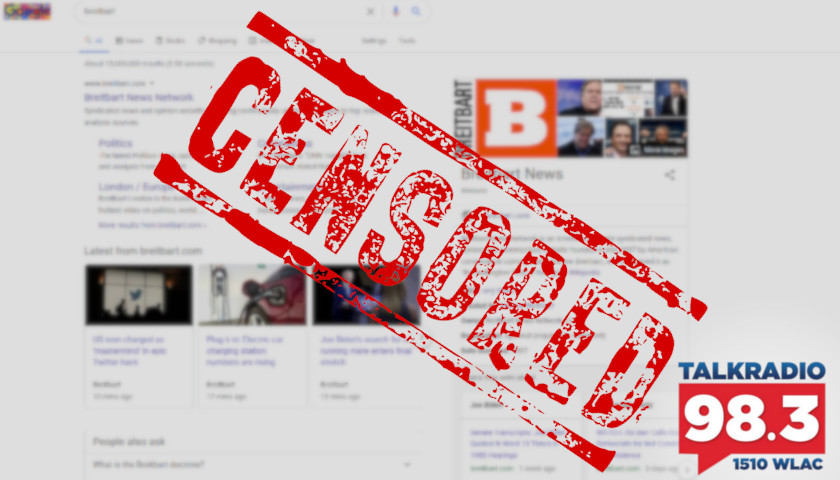Live from Music Row Friday morning on The Tennessee Star Report with Michael Patrick Leahy – broadcast on Nashville’s Talk Radio 98.3 and 1510 WLAC weekdays from 5:00 a.m. to 8:00 a.m. – host Leahy welcomed Breitbart colleague Allum Bokhari to the newsmakers line.
During the third hour, Bokhari weighed in on the recent Google suppression of search results for the Breitbart News site citing a 99.7 percent decrease of traffic to their site. He also called for a revision to Section 230 where the law allows the social media giants to censor anything they find objectionable, lawsuits over defamation, and their immunity from lawsuits over the removal of contents.
Leahy: We are joined now by my Breitbart colleague who has perhaps one of the most important stories of the year published at Breitbart this week. Allum Bokhari the author of Election Interference: Google Purges Breitbart From Search Results. Welcome, Allum. Great to talk with you.
Bokhari: Hi Michael. Great to be on.
Leahy: So break this down for our listening audience. We know that Google has been suppressing search engine results. But you’ve got the facts here and it’s pretty stunning.
Bokhari: Absolutely. We know that Google reacted in panic to the election of Donald Trump in 2016. They were expecting a Clinton victory and they didn’t get it. We saw a video of executives having meltdowns a few days after the elections talking about the need to make the populist movement a blip in history.
That was one of the words of their executives Sergey Brin comparing Trump to an extremist. He was saying he was offended by the election results. And now four years later we’re seeing the results of that bias if you look at data from Google traffic we’ve been receiving ever since then. And I’m not making this up.
Breitbart’s news visibility on Google searches has gone down 99 percent since the inauguration of Donald Trump. They’ve completely pushed our search visibility off a cliff. Obviously they are claiming this is all just an accident and this is a natural consequence of changes they made that were directly targeting us. I don’t see how you reduce the visibility of the webs top conservative news site by 99.7 percent and call it an accident.
Leahy: And Allum its not just Breitbart. Other conservative sites are experiencing this. They had another story about the Daily Caller. They had the same thing happen to them.
Bokhari: Absolutely. The Daily Caller editor-in-chief shortly after they published our story said that they’ve had a huge problem with Google as well and their traffic has declined considerably. And similarly to us when you Google the specific headline names of Daily Caller articles sometimes they don’t come up in Google which is insane. You’ll never hear the same things happening to The New York Times or CNN.
Leahy: As you know I’ve been writing for Breitbart since 2012. You’ve been writing since 2015.
Bokhari: Around then yes.
Leahy: I also own and operate four online news sites. The Tennessee Star here in Tennessee. The Michigan Star, The Minnesota Sun, and The Ohio Star. And I can tell you the same kind of suppression that you see by Google of in search results of Breitbart content and of Daily Caller content, I can tell you we experience that at The Tennessee Star in spades as well.
Bokhari: It’s amazing how every online publisher is now dependent on these tech giants. Essentially Facebook and Google and the amount of power they have over the publishing industry. I don’t think any other company in history has had this much power over publishing.
And it’s something I think where you need some sort of oversight and due process. Google and Facebook shouldn’t be allowed to simply bury publishers and new sites whenever they choose without telling anyone. Without any oversight or due process.
Leahy: What is in your view the public policy solution for this basically censoring and monopoly conduct of Google?
Bokhari: One of the most basic things is transparency. At the moment Google and these tech giants can make these algorithm adjustments that impact and don’t have to tell anyone about it. Or explain what they’re doing or how they are doing. The other thing is some form of due process needs to be imposed. If you think of a commercial landlord they aren’t allowed to evict a business from their property just for arbitrary reasons, they have to follow the law.
They have to go through a legal process whereas Facebook or Google or YouTube can kick whoever they want off regardless of whether they are business or not. Or if they employ people and if their livelihoods are dependent on Google or Facebook or one of these other platforms. They don’t have to follow any form of legal due process. That’s an insane double standard to me.
And then the final thing you can do is reform Section 230 which is the 1990s law that essentially gives tech companies the legal privilege that no other company enjoys that makes them immune from lawsuits over defamation. And it also makes them immune from lawsuits over the removal of contents.
Leahy: My co-host this morning Allum is Crom Carmichael. And Crom has a question for you.
Carmichael: Well I think you just answered it. (Bokhari chuckles) The very last phrase you just said. I understand that 230 makes it so that you can’t sue them for defamation. But you are now saying you also can’t sue them for what you are saying they are doing.
And so it also I guess means that it’s OK for them to go sit down in front of Congress and claim under oath that they are not doing what they are clearly doing. And apparently that’s not illegal either. I don’t understand how you can say you are not doing something that you are doing. And how the law protects you from essentially lying to Congress and lying to the public. So it sounds like your answer is we need to get rid of Section 230.
Bokhari: Well we certainly need to reform it. The problem with Section 230 is that one of those legal immunities, the protection from defamation sort of makes sense if you are a social media platform you from millions and billions of people some times and holding the tech companies libel for everything people post would make their business model impossible.
It would make free speech on the internet very different. But the second part of Section 230 allows them to censor anything they find objectionable. And I’ve never understood why Congress gave them that privilege and why they need it. And why they can’t just simply turn over control of content to the users and let users filter what they want out of their feeds.
Use the block button use and various filtering tools that tech companies are capable of providing. Google has provided users with a safe search option for a long time allowing users to filter obscene search results. And they can do the same thing with hate speech and fake news and all of these other words they’ve invented to censor the right. They are keeping top-down filters they want to.
Carmichael: What year was that law passed? Do you know?
Bokhari: I think it was 1990.
Leahy: I think it was 1998 Allum when it was passed.
Carmichael: Did Democrats control the House and the Senate when it passed?
Bokhari: That I’m not entirely sure. What I can tell you is that it was before the rise of Google and Facebook and all of these internet monopolies. It was when the internet was still a network of decentralized websites.
Leahy: It wasn’t as big as it is right now. Let me ask you a final question here about your great article. You write about Dr. Robert Epstein who is a psychologist and former Hillary Clinton supporter. He spent the last half-decade studying the effects of search engine bias on voters. He said that Google could change the outcome of the election of votes by as much as 10 percent. Do you agree with Dr. Epstein?
Bokhari: I can certainly see that because you have to remember that a 10 percent down cycle is enough to swing an election that Google chooses. And again it’s insane to me that there is no oversight that they have this amount of power. It makes Google the dominant search engine. They control over 90 percent of the search markets.
It’s an enormous amount of power over the information we receive. Think if you were an undecided voter or you are on the fence. What you want is more information. And where does everyone go for information when they want to find out something on candidates? They go to Google. They ask Google to sort the information for them.
Leahy: Allum Bokhari the tech editor at Breitbart News. Thank you for joining us today.
Listen to the full third hour here:
– – –
Tune in weekdays from 5:00 – 8:00 a.m. to the Tennessee Star Report with Michael Patrick Leahy on Talk Radio 98.3 FM WLAC 1510. Listen online at iHeart Radio.





